-- Brad Friedman, The BRAD BLOG
 As if the former U.S. Election Assistance Commission (EAC) chair Paul DeGregorio hadn't done enough damage to our nation's electoral system during his disastrous reign as a commissioner from 2003 to 2007, it looks like he's now more than happy to cash in on his Bush-appointed public post in the private sector as Chief Operating Officer for a dubious Internet voting operation.
As if the former U.S. Election Assistance Commission (EAC) chair Paul DeGregorio hadn't done enough damage to our nation's electoral system during his disastrous reign as a commissioner from 2003 to 2007, it looks like he's now more than happy to cash in on his Bush-appointed public post in the private sector as Chief Operating Officer for a dubious Internet voting operation.
Everyone Counts (E1C) is the San Diego-based firm which ran "America's first all-digital online and telephone election" in Honolulu, which was completed last week. That's the way it was described by Aaron Contorer, the company's Chief of Products and Partnership, in a very thinly disguised press release, sadly posted, as if a news article, recently by Huffington Post. [Full Disclosure: We also contribute articles to HuffPo, though we try to offer news, rather than press releases.]
As COO of Everyone Counts, DeGregorio has posted a video commercial (and a bad one at that, see the bottom of this article where it's re-posted) on his bio page at the company website. His face is also featured on the front page of their site. In the short video, DeGregorio crows about his 22 years in the election "business" while posing in front of the U.S. Capitol and Washington Monument in D.C.
Trading on his former self-proclaimed status as "America's chief election official," DeGregorio endorses the private company for which he now works, noting in the video: "I've been involved in this business for 22 years, having risen to the, America's Chief election official. And I have found that Everyone Counts is the place for me to be, because it's the only organization that provides transparency, accessibility, security and choice. And I think that's the most important thing for any election official, anywhere in the world."
While evidently accuracy doesn't even make DeGregorio's list of "most important thing[s] for any election official" --- not surprising, given his oversight, during his tenure at the EAC, of federal approval for myriad electronic voting systems that fail to meet federal accuracy standards --- the idea that EC's Internet voting schemes provide "transparency" seems to be entirely without evidence, as The BRAD BLOG confirmed with a representative of the Honolulu Neighborhood Commission Office which sponsored last week's election.
Moreover, Everyone Counts' virtual election in Hawaii, according to late news reports this week, seems to have been a dismal failure, at least if the 83% plummet in voter participation might be taken as any indication, in addition to the election's lack of transparency and verifiability.
Numerous commenters, including us, left responses to Contorer's misleading and disinformative HuffPo item, noting serious concerns about E1C's "all-digital" voting scheme. Concerns were expressed by many posters about citizens' lack of ability to verify the accuracy of votes cast, and of transparency and security in the system which, Contorer claims, employs "military-grade encryption technology." He goes on to try to convince readers that it's also "faster, more reliable, and more secure than if they had voted on paper." He failed to answer to any of our critical comments, however, and neither did he offer evidence to back up his claims about his company's superior reliability and security over fully-transparent, paper-ballot voting.
Despite his shameless promotion, and an offer in his video to contact him with any questions, DeGregorio himself did no better in responding to our request for comment in regard to our concerns...
Unsecure, Unverifiable
According to Honolulu's Star Bulletin, 115,000 voters were mailed nine-digit PIN numbers earlier this month, which they could then use to vote from their home computer, a touch-tone telephone, or one of several computer sites that the Neighborhood Commission Office had set up for voters to vote online if they didn't have access to their own computer (or telephone, presumably).
Setting aside that there is apparently no way for citizens to know that anybody's vote was actually recorded accurately by the EC techno-voting scheme, we were curious what safeguards were in place to keep any of those 115,000 voters from giving their PIN number away to someone else --- either out of friendliness or for profit --- to allow them to vote in their place.
Unlike Contorer, or anybody else at E1C, Bryan K Mick, a representative from the Neighborhood Commission in Honolulu, was very responsive to our queries. He conceded that "there is no procedure to stop someone from selling their vote," though he noted that along with the PIN number, the last four-digits of a voters' Social Security Number must be entered in order to vote via the E1C system. That, he believed, made the system "more secure" than their previous paper-ballot elections.
"In previous years we mailed everyone a paper ballot along with a return envelope," he told us via email. "Although the return envelope [required] a signature, we did not have access to any signature database and therefore someone could simply have forged a signature. We therefore feel that this election is actually more secure."
In response to follow-up questions, in which we noted that at least a signature would allow for some kind of authentication of votes, if allegations of fraud had occurred, Mick agreed we were "correct," and "if there had been an allegation of fraud [with their paper system] we could pull the envelope."
"I assume the City Clerk maintains a database [of signatures], but we don't have access to it, at least at the current time," he told us, before adding, "I know of no allegations of voter fraud."
Mick seemed unaware of the many reports from governmental and private computer scientists and security experts who have argued that Internet voting is not secure. "I disagree that computer and voting experts don't like this method," he wrote. "Quite the opposite. If it wasn't safe, there would be no way billions of dollars would be moved online every day."
That's the same line of rationalization Contorer mentioned in his Huff Po blog item, which misleads readers by arguing that "We have been banking online and shopping online for over a decade," so it must be time to vote that way too!
Contorer failed to note --- and likely failed to inform Mick, or the others in Honolulu - that Internet business transactions, while certainly less than 100% secure, are made far more secure via the transparency that comes with them. Unlike a secret ballot that can't be traced to it's "owner" once it's been cast, business transactions can be tracked, transparently, double-checked, and triple-checked by all of those who are parties to the transaction, at any time afterward, to help ensure accuracy. That's simply not the case with a secret ballot.
Ellen Theisen of the non-partisan election watchdog VotersUnite.org summarized just a few of the concerns about Internet voting, as detailed by experts, in her February 2009 testimony [PDF] prepared for the state of Washington. Washington, too, had been foolishly toying with the idea of Internet voting but wisely let the bill proposing it die. Her well-footnoted, three-page testimony describes how scores of experts have found that "safe use of the Internet for voting is essentially impossible, given the technology available today." Theisen's testimony begins with this handy summary:
- In 2004, a panel of experts commissioned by the U.S. Department of Defense concluded that it was not possible to ensure the privacy, security, or accuracy of votes cast over the Internet with its current architecture. They said the attempt to provide secure, all-electronic Internet voting was "an essentially impossible task."
- In 2007, the U.S. Government Accountability Office (GAO) found that email and Internet voting is "more vulnerable to privacy and security compromises than the conventional methods now in use" and that "available safeguards may not adequately reduce the risks of compromise."
- In 2008, the National Institute of Standards and Technology (NIST) wrote, "Technology that is widely deployed today is not able to mitigate many of the threats to casting ballots via the web."
- In 2008, thirty leading computer science experts and professors at major universities signed a statement asserting that until "serious, potentially insurmountable, technical challenges" are overcome, permitting the Internet to be used for public elections "is an extraordinary and unnecessary risk to democracy."
Theisen offered more supporting quotes from experts in an additional 7-page document [PDF]. We suspect Everyone Counts shared none of these warnings with the good folks of Honolulu.
Ironically enough, while Honolulu's Mick had noted hopes that this year's "all-digital" election might boost participation above the 25% of eligible voters who took part in last year's election, the local ABC affiliate reports this week that participation in this year's first "all-digital" election plummeted by 83%, compared to last year:
For the first time, Oahu voters had to use computers or the telephone to vote for their neighborhood board candidates and many people did not bother.
About 7,300 people voted this year, compared to 44,000 people who voted in the last neighborhood board race in 2007.
In another one of the many ironies related to this story, a judge in Hawaii, just last week, as voting in Honolulu's local election was concluding, halted the use of electronic voting machines, and the Internet transmission of votes, in both state and federal elections in the state. Judge Joseph E. Cardoza found that the state's use of Hart Intercivic e-voting systems was not implemented through lawful rulemaking, and that the Internet transmission of vote counts was not in compliance with state law.
As Honolulu's elections were local only, Cardoza's finding didn't apply. In either case, it didn't matter. This election was for the benefit of Everyone Counts, and their hopes of getting rich by undermining American democracy with Internet elections. It's certainly not for the benefit of the voters, and the laws of Hawaii, like their voters, don't matter a lick.
Speaking of Failures, DeGregorio Knows Better, Doesn't Care
 Everyone Counts' DeGregorio was the EAC chair who first buried, and then completely rewrote, a bi-partisan report on "voter fraud," or lack thereof (without consulting the reports' authors) during his ignominious tenure at the federal commission. He had colluded, with fellow St. Louis, MO, hometown colleague and GOP "voter fraud" scam gangster, Thor Hearne of the American Center for Voting Rights (ACVR, whom The BRAD BLOG has spent many years exposing as the anti-democracy thug operation that they are), in hopes of keeping the report, which showed little or no evidence of actual polling-place voter fraud, from being seen by the public, prior to the 2006 election.
Everyone Counts' DeGregorio was the EAC chair who first buried, and then completely rewrote, a bi-partisan report on "voter fraud," or lack thereof (without consulting the reports' authors) during his ignominious tenure at the federal commission. He had colluded, with fellow St. Louis, MO, hometown colleague and GOP "voter fraud" scam gangster, Thor Hearne of the American Center for Voting Rights (ACVR, whom The BRAD BLOG has spent many years exposing as the anti-democracy thug operation that they are), in hopes of keeping the report, which showed little or no evidence of actual polling-place voter fraud, from being seen by the public, prior to the 2006 election.
Given the Republican DeGregorio's seeming obsession with "voter fraud" during his reign at the EAC, it seems a tad ironic that he'd be fronting for an e-voting vendor whose "all-digital" voting procedures virtually beg to be defrauded, and whose accuracy, in any case, can never be verified by the public.
While we report far more on these pages, on the very real concerns about Election Fraud (fraud by insiders in the election "business" who are easily able to manipulate entire elections with the effort of little more than a key stroke or two) than on the imagined concerns about Voter Fraud (rarely used at the polls, as it's a very difficult and dangerous way to game an election and requires a large conspiracy which is easily discovered, even though the GOP shamelessly exploits those concerns in order to implement disenfranchising polling-place ID restrictions to keep Democrats from casting legal votes), we recognize the way in which that sort of fraud can occur. Most frequently, it occurs via absentee voting, which is not subject to the same sort of ID restrictions Republicans across the country have been pushing to implement. However, unlike DeGregorio, apparently, we'd never do anything to help encourage such fraud. No, not even for money, as DeGregorio is seemingly all too happy to do.
Moreover --- and not surprisingly --- AP and Fox "News" were similarly all too happy to offer a largely glowing report on Honolulu's experiment, downplaying any concerns of fraud, and not bothering to note the dismal "turnout" in last week's election.
At the end of DeGregorio's video ad for Everyone Counts, he says: "So check us out. Check out our webpage. See what Everyone Counts has to offer," before concluding: "Contact us, and we'll get right back to you."
Well, we contacted Everyone Counts, several times, via email, requesting response to our questions about the security and transparency of their voting schemes. They never bothered to respond.
Maybe it's not their fault, though. Perhaps the notes just got lost when they were sent over the Internet.
Here is former U.S. EAC chair Paul DeGregorio's one-and-a-half-minute video commercial for Everyone Counts, as posted on his bio page at their website...


 Kamala Rising:
Kamala Rising: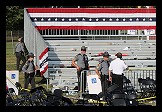 Evidence Fails to Establish Attempted Trump Assass-ination Politically Motivated
Evidence Fails to Establish Attempted Trump Assass-ination Politically Motivated Former MAGA 'Cultist' on the State of the Race for 'MAGA Americans': 'BradCast' 7/23/24
Former MAGA 'Cultist' on the State of the Race for 'MAGA Americans': 'BradCast' 7/23/24  'Green News Report' 7/23/24
'Green News Report' 7/23/24
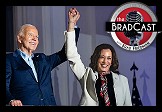 Biden Out, Endorses
Biden Out, Endorses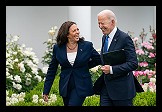 BIDEN DROPS REELECTION BID
BIDEN DROPS REELECTION BID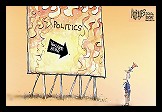 Sunday 'You Are Here' Toons
Sunday 'You Are Here' Toons What J.D. Vance Forgot to Tell You (and Lied About) at the RNC: 'BradCast' 7/18/24
What J.D. Vance Forgot to Tell You (and Lied About) at the RNC: 'BradCast' 7/18/24 'Green News Report' 7/18/24
'Green News Report' 7/18/24 Holding on for Dear Life Amid the Political Whirlwind: 'BradCast' 7/17/24
Holding on for Dear Life Amid the Political Whirlwind: 'BradCast' 7/17/24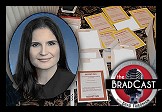 Cannon's Corruption: 'BradCast' 7/16/24
Cannon's Corruption: 'BradCast' 7/16/24 'Green News Report' 7/16/24
'Green News Report' 7/16/24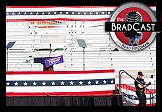 Amid the Assassination Attempt Aftermath:
Amid the Assassination Attempt Aftermath:
 Meanwhile... : 'BradCast' 7/11/24
Meanwhile... : 'BradCast' 7/11/24 'Green News Report' 7/11/24
'Green News Report' 7/11/24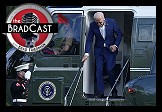 Paging 'Johnny Unbeatable'! Dems (Actually!) in Disarray!: 'BradCast' 7/10/24
Paging 'Johnny Unbeatable'! Dems (Actually!) in Disarray!: 'BradCast' 7/10/24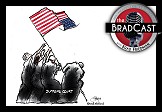 SCOTUS Immunity Ruling 'As Bad as it Sounds', And Worse: 'BradCast' 7/9/24
SCOTUS Immunity Ruling 'As Bad as it Sounds', And Worse: 'BradCast' 7/9/24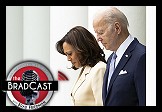 So, What Now?: 'BradCast' 7/8/24
So, What Now?: 'BradCast' 7/8/24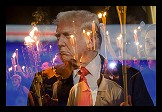 Debunking MAGA Cult Xenophobia
Debunking MAGA Cult Xenophobia A Friendly Suggestion: Harris-Newsom 2024
A Friendly Suggestion: Harris-Newsom 2024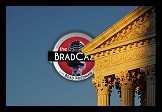 Prosecutor: SCOTUS Corruption Ruling Less Corrupt Than Appears: 'BradCast' 6/27/24
Prosecutor: SCOTUS Corruption Ruling Less Corrupt Than Appears: 'BradCast' 6/27/24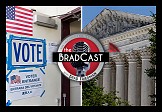 Good News and Bad: At the Polls and From the Corrupted Court: 'BradCast' 6/26/24
Good News and Bad: At the Polls and From the Corrupted Court: 'BradCast' 6/26/24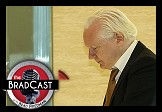 'Emptywheel' on Assange Hacking, Plea Deal: 'BradCast' 6/25/24
'Emptywheel' on Assange Hacking, Plea Deal: 'BradCast' 6/25/24
 VA GOP VOTER REG FRAUDSTER OFF HOOK
VA GOP VOTER REG FRAUDSTER OFF HOOK Criminal GOP Voter Registration Fraud Probe Expanding in VA
Criminal GOP Voter Registration Fraud Probe Expanding in VA DOJ PROBE SOUGHT AFTER VA ARREST
DOJ PROBE SOUGHT AFTER VA ARREST Arrest in VA: GOP Voter Reg Scandal Widens
Arrest in VA: GOP Voter Reg Scandal Widens ALL TOGETHER: ROVE, SPROUL, KOCHS, RNC
ALL TOGETHER: ROVE, SPROUL, KOCHS, RNC LATimes: RNC's 'Fired' Sproul Working for Repubs in 'as Many as 30 States'
LATimes: RNC's 'Fired' Sproul Working for Repubs in 'as Many as 30 States' 'Fired' Sproul Group 'Cloned', Still Working for Republicans in At Least 10 States
'Fired' Sproul Group 'Cloned', Still Working for Republicans in At Least 10 States FINALLY: FOX ON GOP REG FRAUD SCANDAL
FINALLY: FOX ON GOP REG FRAUD SCANDAL COLORADO FOLLOWS FLORIDA WITH GOP CRIMINAL INVESTIGATION
COLORADO FOLLOWS FLORIDA WITH GOP CRIMINAL INVESTIGATION CRIMINAL PROBE LAUNCHED INTO GOP VOTER REGISTRATION FRAUD SCANDAL IN FL
CRIMINAL PROBE LAUNCHED INTO GOP VOTER REGISTRATION FRAUD SCANDAL IN FL Brad Breaks PA Photo ID & GOP Registration Fraud Scandal News on Hartmann TV
Brad Breaks PA Photo ID & GOP Registration Fraud Scandal News on Hartmann TV  CAUGHT ON TAPE: COORDINATED NATIONWIDE GOP VOTER REG SCAM
CAUGHT ON TAPE: COORDINATED NATIONWIDE GOP VOTER REG SCAM CRIMINAL ELECTION FRAUD COMPLAINT FILED AGAINST GOP 'FRAUD' FIRM
CRIMINAL ELECTION FRAUD COMPLAINT FILED AGAINST GOP 'FRAUD' FIRM RICK SCOTT GETS ROLLED IN GOP REGISTRATION FRAUD SCANDAL
RICK SCOTT GETS ROLLED IN GOP REGISTRATION FRAUD SCANDAL VIDEO: Brad Breaks GOP Reg Fraud Scandal on Hartmann TV
VIDEO: Brad Breaks GOP Reg Fraud Scandal on Hartmann TV RNC FIRES NATIONAL VOTER REGISTRATION FIRM FOR FRAUD
RNC FIRES NATIONAL VOTER REGISTRATION FIRM FOR FRAUD EXCLUSIVE: Intvw w/ FL Official Who First Discovered GOP Reg Fraud
EXCLUSIVE: Intvw w/ FL Official Who First Discovered GOP Reg Fraud GOP REGISTRATION FRAUD FOUND IN FL
GOP REGISTRATION FRAUD FOUND IN FL


































